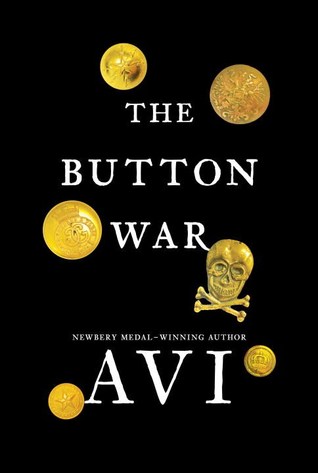 |
| Click to view on Goodreads |
Twelve-year-old Patryk knows little of the world beyond his tiny Polish village; the Russians have occupied the land for as long as anyone can remember, but otherwise life is unremarkable. Patryk and his friends entertain themselves by coming up with dares — some more harmful than others — until the Germans drop a bomb on the schoolhouse and the Great War comes crashing in. As control of the village falls from one nation to another, Jurek, the ringleader of these friends, devises the best dare yet: whichever boy steals the finest military button will be king. But as sneaking buttons from uniforms hanging to dry progresses to looting the bodies of dead soldiers — and as Jurek’s obsession with being king escalates — Patryk begins to wonder whether their “button war” is still just a game. When devastation reaches their doorstep, the lines between the button war and the real war blur, especially for the increasingly callous Jurek. Master of historical fiction Avi delivers a fierce account of the boys of one war-torn village who are determined to prove themselves with a simple dare that spins disastrously out of control.
(240 pages)
I'll be perfectly honest: I had very, very high expectations for The Button War because it's written by Avi. Most people love Avi for The True Confessions of Charlotte Doyle, but the truth is that I barely even remember that book; no, the reason I had high hopes for this new Avi read was because I was obsessed with his The Secret School when I was little. It grabbed my fascination in a big way, with its tale of children banding together to trick their parents into letting them continue to get an education after their teacher leaves.
I suppose that in some ways The Button War is the opposite of The Secret School. Where the earlier book showed children banding together to improve themselves, devoting themselves to their studies and staying relatively well-behaved, The Button War tells the story of a band of school-aged boys who, when left to their own devices, egg each other on to do reckless, stupid things–like the titular competition to steal the brightest, fanciest buttons from the uniforms of the various armies invading their small town.
It's frankly not very fun to read, because I spent most of the book wanting to reach out and smack Jurek–and the other boys for caring enough about his words to put themselves and their families in danger like that. It's one thing to read about people putting themselves in danger during WWII to save Jews from the Holocaust, but watching Patryk's band of friends get in danger for the sake of such a stupid game was just painful. I suppose it's a reflection of the violence they've grown up around, that they've become so desensitized to it and reckless that they would behave in this way, but I didn't really enjoy it.
I think The Button War is a pretty good book, but I for one just found it so frustrating that I didn't get much out of it. You might like it more than I did, though.
Disclaimer: I received a complimentary copy of this book from the publisher in exchange for an honest review.
I'll be perfectly honest: I had very, very high expectations for The Button War because it's written by Avi. Most people love Avi for The True Confessions of Charlotte Doyle, but the truth is that I barely even remember that book; no, the reason I had high hopes for this new Avi read was because I was obsessed with his The Secret School when I was little. It grabbed my fascination in a big way, with its tale of children banding together to trick their parents into letting them continue to get an education after their teacher leaves.
I suppose that in some ways The Button War is the opposite of The Secret School. Where the earlier book showed children banding together to improve themselves, devoting themselves to their studies and staying relatively well-behaved, The Button War tells the story of a band of school-aged boys who, when left to their own devices, egg each other on to do reckless, stupid things–like the titular competition to steal the brightest, fanciest buttons from the uniforms of the various armies invading their small town.
It's frankly not very fun to read, because I spent most of the book wanting to reach out and smack Jurek–and the other boys for caring enough about his words to put themselves and their families in danger like that. It's one thing to read about people putting themselves in danger during WWII to save Jews from the Holocaust, but watching Patryk's band of friends get in danger for the sake of such a stupid game was just painful. I suppose it's a reflection of the violence they've grown up around, that they've become so desensitized to it and reckless that they would behave in this way, but I didn't really enjoy it.
I think The Button War is a pretty good book, but I for one just found it so frustrating that I didn't get much out of it. You might like it more than I did, though.
Disclaimer: I received a complimentary copy of this book from the publisher in exchange for an honest review.
No comments:
Post a Comment
Join the conversation!